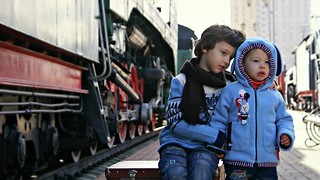Theatre: Disco Pigs
Tom Powell on an enjoyable if overfull tale of Irish teenage life

Disco Pigs is an odd beast of a play. It lies somewhere between The Inbetweeners and A Clockwork Orange. Profligate in its use of the word bumhole and with a near gratuitous level of violence, it's not for the faint hearted, or the overly discerning. It inhabits a world and a lexicon unique to Runt and Pig, a teenage girl and boy rooted in the underclass of 1990s Ireland. This is a cluttered and garish production with a litter of failings and a few beautifully crafted expletives.
The first ten minutes fly by before we can tease out any meaning from the play. We're not helped by their voices - the accents take us on a whirlwind tour of various regions, and only a few of them are in Ireland. Pig (George Johnston) eventually lands in Jamaica and takes up residence there for most of the play. It becomes apparent that we’re seeing the story of their birth; it happens on the same night, the same hospital, the same ward, and ties their futures together, at least until they reach seventeen.
As they tell each other’s stories and embark upon their own adventure, that of Runt’s (Maria Pawlikowsa) 17th birthday, the play requires complete physical commitment. They both set-to with gusto, and there are a few deft touches of bodily comedy. But it’s not enough. It’s perhaps a failing of the character Pig that he’s incredibly hard to like; the play gets much better when Runt is allowed to come to the fore. Pawlikowsa is a charismatic stage presence, and unlike Pig her character is allowed a little space for reflection – and that makes a big difference. Pig is all flailing limbs, floppy hair and slack jaw – which works fine for a portrayal of an out-of-it delinquent, but you’re left wondering if there’s any more to the character at all. And you shouldn’t be wondering.
It’s significant that a production where so much of the focus is on language is at its best when it’s silent. It finds itself about half way in, and the first moment of silence after the frenetic disco pace is both a relief and something special. There’s an exquisite scene where they’ve left a club to peek at the ocean, and Pig watches Runt drift off into sleep, as he waits, fiddles, gets bored and speaks to her. It’s points like this the underlying dynamic of their relationship springs to the fore, and is genuinely touching – but the production should realise that it’s not Pig screaming at Runt not to leave him, but the collective breath the audience takes as he stops and she goes that are affecting. There are several beautiful moments of silence, and this shared intimacy is something that is not too often given life on a Cambridge stage, where pace and verbosity is the norm.
The director and cast deserve plaudits for this, and for some thorough character work, but these are rare glimpses of something else in a play awash with movement and chaos. What’s on stage is a pair of overgrown children impressing each other with violence and obscenity – but their shared umbilical bond, their childhood affection, is underexplored to make way for their Grand Theft Auto imitation of adulthood. There are some interesting things going on, but for each killer line there’s one that murders the atmosphere. It’s all broken up by agonising disco interludes that add nothing but an appreciation of how little room there is to act in, between the various cluttered divisions that the set makes of the stage.
Disco Pigs is unlike a whole lot of things you’ll see on a Cambridge stage. I like that about it – but it’s a frustrating, at times impenetrable, occasionally painful experience. It just goes to show, in theatre: bravery isn’t enough.
Disco Pigs is on at the ADC until Saturday, 11pm. The author wishes it to be known he did not assign the star rating himself.
 News / Cambridge climbs to third in world Uni rankings11 October 2025
News / Cambridge climbs to third in world Uni rankings11 October 2025 Features / How to spend a Cambridge summer12 October 2025
Features / How to spend a Cambridge summer12 October 2025 Comment / Bonnie Blue is the enemy, not the face, of female liberation13 October 2025
Comment / Bonnie Blue is the enemy, not the face, of female liberation13 October 2025 News / Join Varsity this Michaelmas13 October 2025
News / Join Varsity this Michaelmas13 October 2025 News / Tompkins Table 2025: Trinity widens gap on Christ’s19 August 2025
News / Tompkins Table 2025: Trinity widens gap on Christ’s19 August 2025









